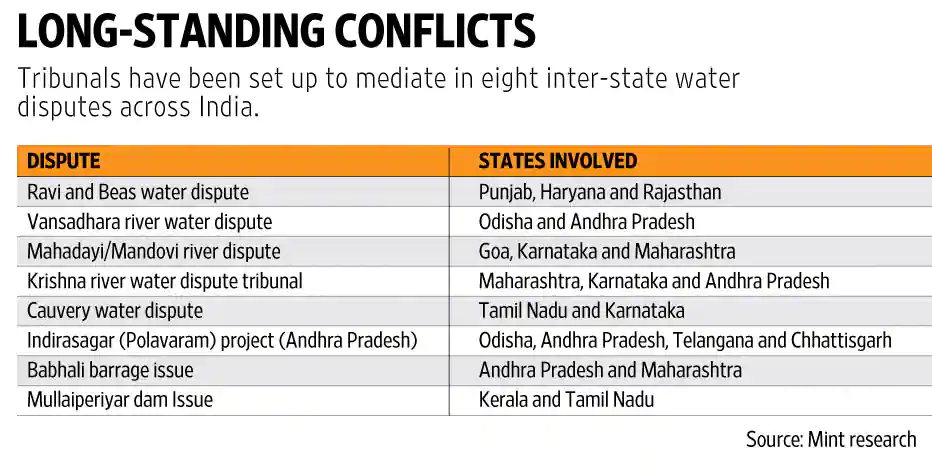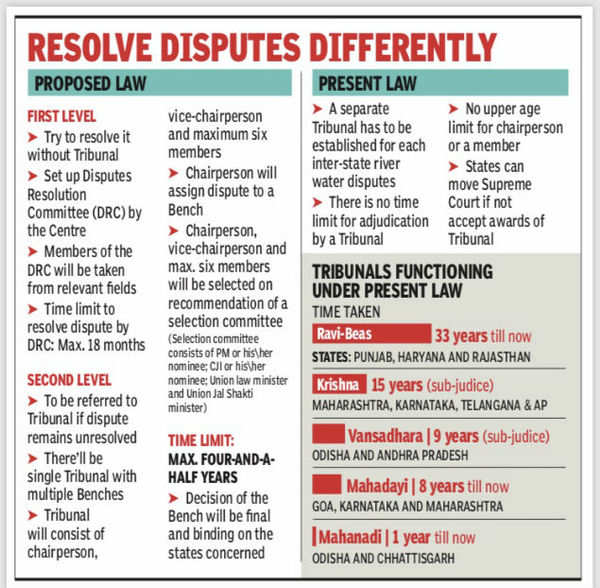- Home
- Prelims
- Mains
- Current Affairs
- Study Materials
- Test Series
 EDITORIALS & ARTICLES
EDITORIALS & ARTICLES
Inter-state river water disputes
- The Pennaiyar river dispute, the Mahadayi dispute, the Sutlej Yamuna linking canal, and water-sharing dispute between Punjab and Haryana among others even after many years of formation of tribunal to resolve the disputes is a matter of huge concern.
- Each year Tamil Nadu faces severe drought in many regions of the state as Pennaiyar river dispute is yet not resolved.
- Even the Karnataka is facing the water shortage due to its huge population and urbanisation needs due to unresolved Pennaiyar river dispute.
- Most parts of water of Sutlej River, majority of which has been flowing in Pakistan, could have been used by India’s agricultural activities if the Sutlej Yamuna linking canal project had been completed.
Inter-State River Water Disputes:
- The Inter-State River Water Disputes arises when a river flows from more than one state and all of them have unresolved issues regarding distribution and cost managements of river projects.
- Inter-State Water Sharing Disputes in India arise over the use, distribution, and control of waters of inter-state river basins.
- Many inter-state river water disputes tribunals have been constituted to resolve water problems between states.
 Constitutional Provisions for Inter-state Water Disputes:
Constitutional Provisions for Inter-state Water Disputes:
- Entry 17 of the State List: It deals with water i.e., water supply, irrigation, canal, drainage, embankments, water storage and water power.
- Entry 56 of the Union List: It empowers the Central Government for the regulation and development of inter-state rivers and river valleys to the extent declared by Parliament to be expedient in the public interest.
- Article 262 of the Indian Constitution: In case of disputes related to waters, Parliament may by law provide:
- The adjudication of any dispute or complaint concerning the use, distribution or control of the waters of, or in, any inter-State River or river valley.
- Neither the Supreme Court nor any other court shall exercise jurisdiction in respect of any such dispute or complaint as mentioned above.
Under Article 262, Parliament has enacted:
- River Board Act, 1956:
- The Act empowers the Central Government to establish boards for Interstate Rivers and river valleys in consultation with State Governments.
- Inter-State Water Dispute Act, 1956:
- If State Government(s) approach the Central Government for the constitution of the Tribunal, the Centre may form a Tribunal after trying to resolve the dispute through consultations.
- The Union government with parliament approval can also make laws on regulation and development of interstate rivers and river valleys to the extent such water resources are directly under its control when expedient in the public interest.
- When public interest is served, President may also establish an interstate council as per Article 263 to inquire and recommend the dispute between the states of India.
Inter-State River Water Disputes Act, 1956:
- The Interstate River Water Disputes Act, 1956 (IRWD Act, 1956) is an Act of the Parliament of India enacted under Article 262 of Indian Constitution.
- Article 262 of the Indian Constitution provides a role for the union government in adjudicating conflicts surrounding interstate rivers that arises among the state/regional governments.
- It was enacted during reorganization of states on linguistic basis to resolve the water disputes that would arise in the use, control and distribution of an interstate river or river valley.
- It had been amended and its most recent amendment took place in the year 2002.
- It is applicable only to interstate rivers/river valleys.
- An action of one state should affect the interests of one or more states.
- It can be divided into two independent parts under IRWD Act:
Actions of a downstream state affecting the interest of an upstream state:
- A downstream state''s action can affect the upstream state''s interest only in one case. i.e., when a downstream state is building a dam/barrage near its state boundary and submerging the territory of an upstream state on permanent/temporary basis.
- No other action of a downstream state could affect the upstream state''s economic, ecological and spiritual/ religious interest.
Actions of an upstream state affecting the interest of a downstream state:
- Construction of water storage reservoirs and using water for any beneficial use such as irrigation, drinking water, industrial, recreation, recharging groundwater, groundwater use, enhanced evaporation losses.
- Other beneficial use includes enhancing rainwater use efficiency, obstructing non-flood flows of the river, transferring water to outside the river basin.
- Quality of water can also be diminished/altered/ controlled in the action of using water by accumulating the dissolved salts in the remaining water after its use.
Inter-state River Water Dispute (Amendment) Bill, 2019:
- The Centre had introduced the Interstate River Water Dispute (Amendment) Bill, 2019 based on Sarkaria Commission’s report.
- It binds the Centre to set up Disputes Resolution Committee (DRC) to amicably resolve the issue by negotiations in one year.
- If the DRC cannot settle the dispute, the Centre must refer it to the interstate tribunal within three months.
- It prescribes timelines while a permanent tribunal with multiple benches is proposed to be set up after dissolving all existing tribunals.
- The tribunal would be appointed on the recommendation of a selection committee comprising the Prime Minister, Chief Justice of India and ministers from the Law and Justice, and Jal Shakti (water) ministries.
- There are currently five existing inter-state river water disputes tribunals constituted under Inter-State River Water Disputes (ISRWD) Act, 1956:
- Ravi and Beas Water Tribunal
- Vansadhara Water Disputes Tribunal
- Mahadayi Water Disputes Tribunal
- Mahanadi Water Disputes Tribunal – for resolving Odisha and Chhattisgarh water disputes.
- Krishna Water Disputes Tribunal
 Suggestions:
Suggestions:
Fair, equitable and reasonable use:
- Use of water shall be determined by the assessment of many factors that depend on history, present circumstances, and social conditions in the regions of interest.
- The equitable shares are to be decided such that each party derives the largest benefit by using water and causes the minimum harm to others.
- A particular water use is beneficial if it is economically or socially valuable and is not detrimental to others.
- Article IV of the Helsinki Rules (1966) has stated on the issue of equitable utilisation of the waters of an international drainage basin.
- The share of a party shall depend upon the factors considered under Article V of Helsinki Rules and weights assigned to various factors.
- In 2018 case on the Cauvery Water Tribunal Award 2007, the Supreme Court of India had invoked the principles of the Helsinki Rules, Berlin Rules and the Campione Rules related to the groundwater (recognising the surface water-groundwater connection) to give the judgement.
- Campione Rules hold that basin States in their respective territories shall manage the waters of an international drainage basin in an equitable and reasonable manner.
Berlin Rules on Water Resources 2004:
- It had superseded the Helsinki Rules.
- It emphasises on:
- Appropriate management of all freshwater sources within the nations
- Climate-related issues
- Minimisation of environmental harm
- Preference to meet vital human needs
- Individual’s right of access to adequate quantity of safe drinking water
The Helsinki Rules:
- The Helsinki Rules describes the relevant factors to be considered in such matter.
- The first set of factors includes the drainage area within each basin state, hydrology and climate in the basin.
- These factors determine basin water resources within each state and their variability.
- The second set of factors determines the utilisation of water by each party and covers the past and current utilisation, and the population dependent on the waters of the basin in each basin state.
- These factors are to be considered along with the relative costs of meeting the needs by alternative means.
- It is important to assess whether each party state is using water most efficiently.
- Weightage shall be assigned to commensurate each factor with its relative importance.
- The Helsinki Rules were limited in their scope to international drainage basins and connected groundwater sources.
Steps to be taken towards State Governments:
- There shall be constitution of river basin boards for integrated river basin management (IRBM), in line with the National Water Policy of 2012.
- The IRBM mechanism will ensures flood protection, rejuvenation and protection of water bodies, wastewater and solid waste management, and water allocation to each sector in the basin to benefit all sections of society.
- Each board of IRBM may be constituted of experts from water and associated domains and civil society representatives from the concerned states.
- With IRBM mechanism, disputes can be addressed at the nascent stage and may not grow big.
Inter State water disputes in India have been longstanding and critical issue that require collaborative approach for solution. Scientific determination of equitable distribution is difficult because the available data may be inadequate. The water distribution should be done with fairness and according to the need of involved states. Union and state governments should have effective discussions and water sharing agreements to promote equitable water distribution across the country. Adaptation of innovative water technologies can play important role in resolving the problems.









 Latest News
Latest News General Studies
General Studies